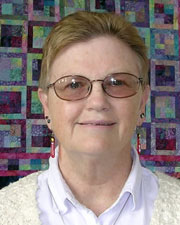Western Civilization class reinvents itself with curriculum change

Sandra Zimdars-Swartz is a KU professor and director of Humanities & Western Civilization Program.
The original reasons for Western Civilization courses at Kansas University and other schools were as lofty as their reading lists.
With soldiers returning from the grisly fronts of World War II, and many taking advantage of the G.I. Bill to go to college, there was a desire to understand the roots of democratic and Western thought as a sort of hedge against future world conflict and fascist uprisings.
A class in Western Civilization was established at KU in 1945. “It served that time very well,” said Antha Cotten-Spreckelmeyer, who joined KU’s humanities and Western Civilization faculty in 1990 and has served as assistant director of the program.
Now, with the rollout of the KU Core curriculum last fall, the class based on teaching some of the oldest ideas in human history has had to reinvent itself to stay relevant and remain accessible to KU’s undergraduates.
Until the KU Core came along, Western Civilization was a requirement for the majority of undergraduates. Spreckelmeyer called the classes a “common learning experience” which future classes could build on.
For KU students, reading Plato’s “The Republic” or René Descartes “Discourse on Method” in Western Civilization was like watching “I Love Lucy” in the days before cable, when people had few choices in what to watch on TV. In that respect, the KU Core gave the same kind of jolt to university departments that cable gave to television programming.
One of the main purposes behind the new curriculum was to give students options, flexibility and choice over their path through the university.
The universitywide KU Core outlines six key learning goals for students on their way to their degree, and to graduate, students have to take a certain number of classes that teach to each learning goal. Freshmen and sophomores can now choose Western Civilization courses from a list of others that aim to impart the same skills.
Sandra Zimdars-Swartz, director of KU’s Humanities and Western Civilization Program, said the change has led to “some decline” in enrollment. At the same time the department has also added a new humanities course to the KU Core that she said is “really taking off,” though not enough yet to offset all the attrition from Western Civilization.
One positive development to come from the change is a larger share of freshmen and sophomores taking the courses in the past two semesters, Zimdars-Swartz said. In previous years, with so many students needing to take the classes and limited resources in the department to teach them, many students didn’t take Western Civilization until their junior or senior year.
“It really is a sequence students should take early in their careers,” Zimdars-Swartz said.
Maybe more importantly, those freshman and sophomores taking the course to fulfill the KU Core are now taking the class by choice, as one class among many possibilities, instead of being forced to take it through a general education requirement.
As a result, Zimdars-Swartz said cases of plagiarism in Western Civilization classes have “dropped dramatically” in recent semesters.
“I think students are slowly going to start opting to take (Western Civilization), and I think that’s a good thing,” she said. “When students opt in instead of being required to take it, it changes the dynamic.”
As for the class itself, the reading lists have been shortened and instructors have more flexibility. The first Western Civilization course in the sequence, which includes works from early Greeks and Romans, Judeo-Christian religious writings and Medieval literature, has been tweaked to include fewer readings and more emphasis on writing instruction to meet a specific KU Core goal.
For its work on updating Western Civilization for the KU Core, the department received the university’s “Christopher H. Haufler Award for KU Core Innovation.”
Even with fewer students taking Western Civilization, Zimdars-Swartz is still optimistic about its place in the university. “We’re in a dynamic transition period, and that’s an exciting thing for us.”







